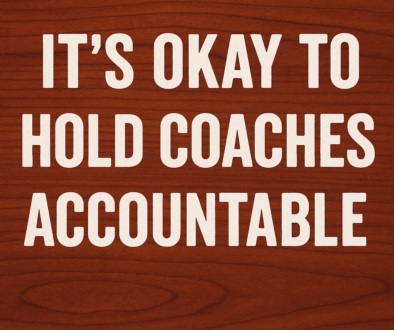The Winning Mentality: Small Habits that Create Big Results in Select Baseball
Success in baseball isn’t just about talent; it’s about preparation, focus, and teamwork. Whether you’re a position player, a pitcher, a catcher, or a coach, the little things you do consistently can make a big impact on the field. Developing the right habits doesn’t just elevate your individual game—it strengthens the team as a whole. Let’s break it down by roles and responsibilities.
Position Players: Scout the Opponent
Being a great position player means more than just reacting to the ball—it’s about anticipating the game. Understanding the tendencies of the opposing pitcher gives you an edge when you step into the batter’s box.
- Analyze Pitch Patterns: Pay attention to how the pitcher approaches different counts. Do they rely on fastballs in pressure situations, or do they trust their off-speed stuff? If you notice a pattern, it can help you be one step ahead.
- Look for Tells: Some pitchers unknowingly reveal what pitch they’re about to throw. Maybe their glove position changes slightly for breaking balls, or they adjust their grip visibly on the mound. Identifying these details can give you a significant advantage.
- Pay Attention to Base Awareness: A pitcher who’s slow to react to runners on base is an opportunity waiting to happen. Notice if they’re consistent with their hold times or if they’re distracted when a runner reaches third base.
These insights don’t just help you—they’re valuable to share with your teammates as part of a collaborative effort to outsmart the opposition.
Pitchers: Know Your Hitters
For pitchers, controlling the game starts with knowing your opponents. A good pitcher isn’t just throwing strikes—they’re playing a mental chess game with the hitter.
- Watch Their Timing: During warmups or the early innings, observe the hitters. Are they on time during the load phase of their swing? If not, you can exploit their timing with varying speeds and pitch locations.
- Identify Weaknesses: What pitches do they chase when they’re down in the count? A hitter who struggles with sliders away or fastballs up can be neutralized in key situations.
- Adapt to Runners on Base: Some hitters become overly aggressive or hesitant when a runner is on. Others may try to bunt or are more likely to swing at the first pitch. Knowing how their approach changes can help you stay in control.
Good pitching isn’t just physical—it’s strategic. Always look for ways to stay one step ahead.
Teammate Support: Everyone Plays a Role
Baseball is a team sport, and the little ways you support each other add up over the course of a game.
- Help Each Other Out: If a teammate makes the last out of the inning, grab their hat and glove and have it ready for them as they take the field. This is especially important for catchers, who have the added responsibility of getting their gear on quickly.
- Catchers Get Priority: If your catcher is busy getting ready, someone should step in to warm up the pitcher. Teamwork like this keeps the game moving smoothly and shows that everyone has each other’s back.
These small acts of consideration build a culture of respect and camaraderie that can make the difference between a good team and a great one.
Coaches: Lead by Example
As a coach, you set the tone for the entire team. Players watch your energy, your reactions, and your leadership style.
- Body Language Matters: Stay positive and confident, even when the game isn’t going your way. Your attitude directly impacts how your players respond to adversity.
- Establish a Culture: Build an environment where accountability, responsibility, and teamwork are non-negotiable. Create clear expectations and hold everyone—yourself included—to those standards.
- Model What You Preach: If you expect your players to hustle, stay focused, and support one another, you need to embody those qualities every day. Actions speak louder than words.
The culture you create as a coach will carry over into how your players approach the game—and life.
Pitchers: Stay Loose, Stay Ready
Long innings can be tough on pitchers. It’s easy to lose focus or let your arm tighten up when your team is busy scoring runs.
- Stay Active: Keep your body moving during long breaks in play. Do band work, arm circles, or light catch to maintain readiness.
- Two-Out Rule: As your team approaches two outs, use the time to prepare mentally and physically for your next inning.
Staying loose isn’t just about preventing injury—it’s about ensuring you’re ready to perform at your best when the spotlight is back on you.
Catchers: Always Be Ready
As a catcher, you’re the backbone of the defense. Your preparation between innings is critical to keeping the game running smoothly.
- Gear Up Quickly: Unless you’re batting, on base, or on deck, make sure you’re ready to go as soon as the third out is made.
- Warm Up the Pitcher: If you can’t warm up the pitcher yourself, have a teammate step in so there’s no downtime.
A prepared catcher keeps the team in rhythm and ensures the defense is always ready to go.
In the Dugout: Talk Baseball
The dugout isn’t just a place to relax—it’s a hub for focus, strategy, and teamwork.
- Engage in the Game: Cheer your teammates on and talk about what’s happening on the field. Share insights, strategies, and observations to help everyone stay sharp.
- Prepare for Your Moment: Whether you’re a pinch hitter or defensive substitute, the dugout is your preparation zone. Stay locked in and ready to contribute.
A focused dugout creates an atmosphere of accountability and teamwork that fuels success on the field.
Hustle to Every Position
Nothing sets the tone for effort like hustling to your position. Walking shows a lack of energy and commitment, while sprinting communicates focus and determination.
- Every Play Counts: Whether it’s the first inning or the ninth, your hustle reflects your mindset.
- Lead by Example: Hustling inspires your teammates to give their best effort, creating a culture of excellence.
This simple habit can shift the momentum of a game and energize the entire team.
Final Thought: The Details Win Games
From studying opponents to supporting teammates, it’s the small, intentional actions that separate good teams from great ones. Baseball is a game of preparation, discipline, and teamwork, and those who focus on the details will find themselves consistently ahead of the competition.
Bring your best every time you step on the field, and success will follow.
TL;DR: Baseball is won through preparation and teamwork. Position players should scout pitchers for patterns, help teammates with small tasks, and stay focused. Pitchers must study hitters, stay loose during long innings, and always be ready to adapt. Coaches lead by example, setting the tone for accountability and energy. In the dugout, talk baseball, stay engaged, and prepare for your next opportunity. Above all, hustle and focus on the details—they make all the difference.









